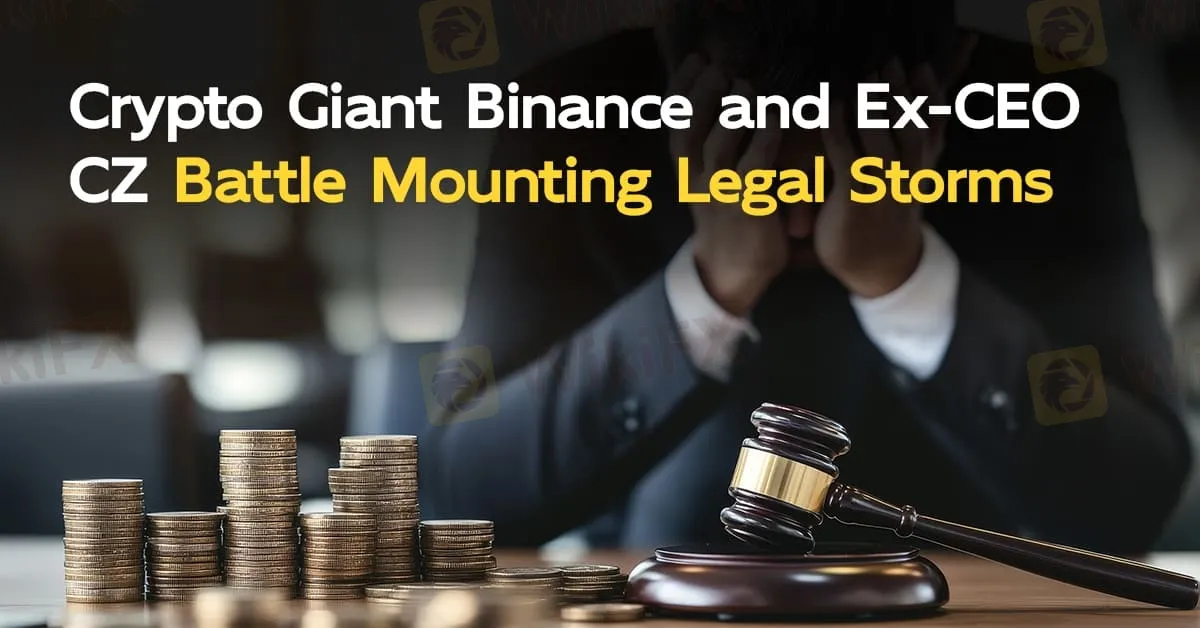简体中文
繁體中文
English
Pусский
日本語
ภาษาไทย
Tiếng Việt
Bahasa Indonesia
Español
हिन्दी
Filippiiniläinen
Français
Deutsch
Português
Türkçe
한국어
العربية
Crypto Giant Binance and Ex-CEO CZ Battle Mounting Legal Storms
Abstract:Binance is facing a new class-action lawsuit from three cryptocurrency investors who allege that the exchange failed to prevent money laundering, leading to the theft and untraceability of their digital assets.

Binance, one of the worlds largest cryptocurrency exchanges, and its former CEO, Changpeng “CZ” Zhao, are embroiled in a series of legal challenges that highlight the regulatory pressures facing the crypto industry.
Binance is facing a new class-action lawsuit from three cryptocurrency investors who allege that the exchange failed to prevent money laundering, leading to the theft and untraceability of their digital assets. The lawsuit, filed in the United States District Court for the Western District of Washington, claims that thieves used Binance to launder stolen cryptocurrency, making it difficult for authorities to recover the assets. The plaintiffs argue that blockchain technology‘s inherent transparency and traceability should have enabled the recovery of their funds, but Binance’s alleged facilitation of money laundering thwarted this possibility.

The lawsuit also claims that Binances actions violate the Racketeer Influenced and Corrupt Organizations (RICO) Act, a law traditionally used to combat organized crime. Bill Hughes, senior counsel at Consensys, expressed scepticism about the plaintiffs' ability to prove their case. However, he noted that if the lawsuit progresses to discovery or trial, it could have significant ramifications for the crypto industry, particularly in terms of blockchain analytics and asset recovery.
Binance has already faced scrutiny and penalties from various global regulators. In India, the Financial Intelligence Unit (FIU) imposed a fine of 188.2 million rupees ($2.25 million) on Binance for operating in violation of local anti-money laundering (AML) regulations. Additionally, Canadas anti-money laundering agency fined the exchange $4.38 million in May for similar violations.
Changpeng Zhao, Binances former CEO, has also been at the centre of legal issues. In November 2023, Zhao pleaded guilty to violating U.S. money laundering laws and the Bank Secrecy Act (BSA), leading to his resignation from Binance as part of a settlement. Zhao, a Canadian citizen, was sentenced to four months in a low-security federal prison in California, significantly shorter than the three-year sentence sought by prosecutors but still notable given his high profile in the crypto world.
Zhaos sentence is set to conclude on September 29, 2024, but he has recently been transferred to an administrative facility in the Greater Los Angeles area, potentially signalling a transition to a residential re-entry program. Despite online speculation about his early release, Zhao remains incarcerated, with his release date still listed as September 29 on the U.S. Federal Bureau of Prisons (BOP) website.
As part of the settlement, Binance agreed to pay $4.3 billion in civil regulatory penalties, and Zhao has been barred from holding any executive position at a cryptocurrency firm in the future. Zhao, with a net worth of $36.5 billion according to Bloomberg, is potentially the wealthiest person ever incarcerated in the United States. In addition to his prison sentence, Zhao was fined $50 million.
The ongoing legal and regulatory challenges faced by Binance and its former CEO underscore the growing scrutiny on the cryptocurrency industry. As authorities around the world tighten regulations, the actions and policies of major players like Binance will likely continue to be closely monitored. The outcome of these legal battles could set significant precedents for how the industry operates and how regulators enforce compliance with financial laws.

Disclaimer:
The views in this article only represent the author's personal views, and do not constitute investment advice on this platform. This platform does not guarantee the accuracy, completeness and timeliness of the information in the article, and will not be liable for any loss caused by the use of or reliance on the information in the article.
Read more

Malaysia’s Crypto Landscape: Adapting Amidst Global Ambitions
The United States is intensifying its efforts to become a global cryptocurrency hub under President-elect Donald Trump. Experts believe this move could prompt countries, including Malaysia, to reassess their regulatory approaches toward digital assets.

SEC Approves Hashdex and Franklin Crypto ETFs on Nasdaq
The SEC has approved crypto index ETFs by Hashdex and Franklin Templeton, including Bitcoin and Ethereum, marking a milestone in crypto asset investment.

North Korean Hackers Steal $1.3bn in Cryptocurrency in 2024
Over $2.2bn in cryptocurrency stolen in 2024, with North Korean hackers accounting for $1.3bn. Discover how cyber theft impacts the evolving crypto landscape.

ASIC Sues Binance Australia Derivatives for Misclassifying Retail Clients
ASIC accuses Binance Australia of misclassifying 500+ retail clients as wholesale, denying key consumer protections for crypto derivatives. Penalties and reforms are underway.
WikiFX Broker
Latest News
ASIC Sues Binance Australia Derivatives for Misclassifying Retail Clients
Top 10 Trading Indicators Every Forex Trader Should Know
WikiFX Review: Is FxPro Reliable?
Malaysian-Thai Fraud Syndicate Dismantled, Millions in Losses Reported
Trading frauds topped the list of scams in India- Report Reveals
Revolut Leads UK Neobanks in the Digital Banking Revolution
Fusion Markets: Safe Choice or Scam to Avoid?
SEC Approves Hashdex and Franklin Crypto ETFs on Nasdaq
WikiFX Review: Something You Need to Know About Markets4you
Malaysian Pensioner Loses RM823,000 in Fake Investment Scam
Currency Calculator


